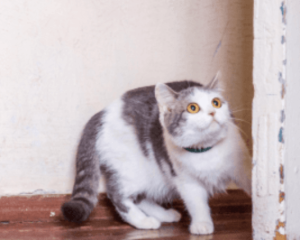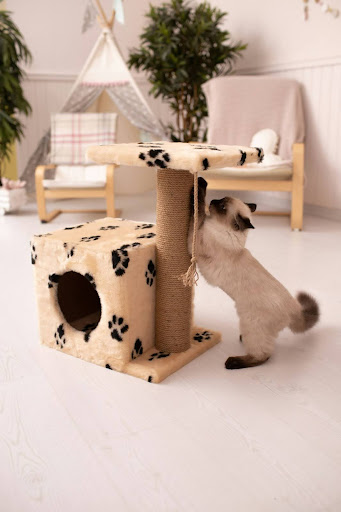
Excessive vocalising in cats
Why does my cat meow so much?
Why does my cat meow at me?
Why does my cat meow at night?
Why does my cat meow when I pick them up?
How to know why your cat is meowing more
What to do if your cat is meowing more
How do I find a qualified behaviourist?
Ways to help at home
What not to do when your cat meows
When is it normal
When to worry

Excessive vocalising in cats
Vocalising is a natural behaviour that cats use to communicate. However, when meowing becomes excessive or inconvenient, it’s a common reason owners seek behaviour advice.
Meowing in adult cats is often to get their humans' attention. Excessive meowing can also occur due to medical problems, especially if the change is sudden or alongside other symptoms. So always speak to a vet first if you notice any change in your cat's behaviour.
Why does my cat meow so much?
There are lots of reasons, and sometimes more than one is involved. Once medical causes have been investigated by a vet, emotional causes can be addressed with the help of a qualified behaviourist.

Medical causes:
Dementia in older cats
Hyperthyroidism in middle-aged to older cats
Urinary problems such as cystitis
Sight and hearing issues
Neurological problems
Unspayed females in season
Uncastrated males seeking out a mate
Emotional causes:
Attention-seeking e.g. to be fed or let in or out
Hunger around feeding times
Habit or learning, that they get what they want after meowing
Greeting their owner
Separation or attachment issues
Boredom or frustration, especially for indoor cats
Aggression/conflict between cats (usually with hissing/yowling too)
Stress, fear or anxiety
Cats are sensitive creatures, meaning feelings of stress, anxiety and fear can be triggered by many things. Common environmental changes that trigger stress and changes in behaviour, like meowing more, include:
Change in routine e.g. being kept indoors
House move or building work
New baby, pet or family member
Loss of a family member
Cats in the neighbourhood scaring them or causing conflict
Visitors or owners going away
Lack of resources such as litter trays, toys and hiding places
Noisy events such as fireworks
Travelling or a trip to the vets
It’s helpful to know what triggers the meowing and observe the cat's body language to understand what’s causing them to meow. Common scenarios include meowing at their owners around meal times, when their owner comes home and at night.
Why does my cat meow at me?
A top cause is to get your attention. Often for food, to be let in and out, for play or cuddles. This behaviour is reinforced and can become a habit when they get what they want after meowing. Medical conditions such as hyperthyroidism can cause excessive hunger and other signs like sickness, weight loss and hyperactivity. Some cats are especially noisy when their owners get home after a period of being left. It’s lovely to be greeted, but boredom and separation issues can also cause this.
Why does my cat meow at night?
Night waking can be a sign of dementia in older cats, alongside other signs such as confusion, toileting indoors and anxiety.
Cats often become more active in the evenings and at night. This is often when they like to play and hunt.
Hunger and attention-seeking can also be causes.
Why does my cat meow when I pick them up?
If a cat is vocalising when being handled, it’s important to look at their body language to understand if they are happy and enjoying the attention, or not. Pain should be ruled out by a vet, especially if the cat is showing aggression too. Arthritis or joint pain is especially common in older cats. Any stroking or handling could be sore for them. Cats like calm, gentle handling on their terms so avoid any rough handling or children handling, especially if aggressive.
Some owners report their cat meowing all the time. Whatever the scenario, working through the problem with a vet and a qualified behaviourist is the best solution.
How to know why your cat is meowing more
Cats are mysterious animals and sometimes the reason is not obvious. If the meowing started suddenly, alongside other symptoms in an older cat, medical causes are more likely. As well as looking at what triggers the meowing, observing the cat’s body language is helpful. Taking video footage can help the vet and behaviourist understand how they are feeling and the best way to help.
A happy cat will show body language such as leg rubbing, purring, ears up and forwards, relaxed posture and tail up. Cats that are meowing for attention but are otherwise well and happy will show these signs.

Cats that are meowing because they are stressed or worried about something will show other behaviours and body language.
Behaviour signs of stress, fear or anxiety:
Licking lips and swallowing
Hiding or more withdrawn
Acting on edge
Off food
Overgrooming
House soiling
Aggression or more irritable
More clingy or attention-seeking
Scratching things
Aggression may be directed at people, other animals, or cats that have to share their space and resources. Other signs like back arching, yowling, hissing and spitting are usually seen too.
Body language indicating stress:
Freezing, tense body
Cowering or low body posture
Tail down or close to the body
Wide eyes and pupils

Speak to a vet straight away if you notice any of these signs. At Joii we have a team of vets, nurses and behaviourists that can help over a video call.
What to do if your cat is meowing more
First of all, get your cat checked over by a vet. They can check for and treat any medical causes or refer you to a qualified behaviourist if needed. For noisy female cats in season, the vet can discuss neutering. If your cat is showing aggression, make sure to give them space and keep them away from anyone that triggers the aggression, especially children. Specific treatments depend on what is triggering the meowing. A qualified behaviourist, vet or vet nurse can help you work through this.
How do I find a qualified behaviourist?
Your vet or online Joii vets can refer you to a qualified accredited behaviourist. It is extremely important to find someone qualified, who uses kind, ethical and up-to-date techniques. Beware of people practicing as behaviourists who aren’t suitably qualified, or who use outdated harmful methods. Organisations such as the ABTC (Animal Behaviour and Training Council) and FAB (Fellowship of Animal Behaviour Clinicians) also have a list of qualified behaviourists in your area.
Ways to help at home
Often cats are meowing for resources and attention. So making sure their key needs are met is a good start. Focus on rewarding the calm and quiet behaviour and ignoring the noisy behaviour. But be prepared for them to get more persistent before they get quieter! Getting the home environment and routine right will help your cat relax and reduce stress.
Home changes to reduce stress
Make sure they have plenty of quiet, cosy, warm areas to rest and hide- ideally high up.
Keep resources including litter trays, food and water bowls separate in quiet, accessible places.
Ensure multi-cat households have one resource per cat, plus one more (so a house with 2 cats, needs 3 litter trays).
Keep feeding and routines as consistent as possible.
Use a microchip cat flap for getting in and out safely without intruders.
Provide mental stimulation and enrichment with dedicated play sessions.
Rotate and vary toys to keep interest e.g. feather chase toys on a string and puzzle toys for hiding treats.
Use climbing trees and scratch posts for natural exploring and scratching behaviour.
-
Keep new pets separate and introduce them gradually.

cat scratching cat tree
Indoor cats are especially prone to boredom and separation issues. Consider using a cat sitter to pop in and give them attention if they are alone for long periods. For cats that are active and meow at night, automatic feeders and an evening play session might help. If your cat is meowing at feeding times, change their routine so they get food when they are quiet. You could also consider feeding little and often over the day and using an automatic feeder. Every cat is different so speak to our Joii team through the app for bespoke advice on feeding.
Calming diffusers and products
Calming diffusers and supplements can help alongside changes in the home and a behaviour plan. Try plugging in a calming diffuser near where your cat likes to rest, especially before a change or event. The Feliway Optimum or Pet Remedy diffusers release calming messages to help relax your cat. They also come in sprays for travelling.
There are many calming supplements on the market with variable effectiveness. ‘Zylkene’ and ‘Yumove calming care’ are supplements proven to reduce stress and anxiety. Speak to a vet before starting these as they shouldn’t be given with some medications.
Speak to our Joii vets for advice on the best calming products for your cat.
What not to do when your cat meows
Avoid punishment or rough handling as this can lead to fear, anxiety and sometimes aggression.
Try to avoid giving them attention for meowing and reward quiet behaviour instead.
Never use disruptive methods such as shock collars or sprays; this can make things worse.
Instead focus on making sure all their needs are met, including feeding, resting, playtime and enrichment.
When is it normal
It’s sometimes tricky to know when meowing is excessive. Often it comes down to how much the owner can tolerate and the timing of the meowing. For example, meowing in the night can be tiring for owners.
Some situations where meowing is normal:
Oriental cats, such as Siamese, tend to be more chatty
Entire females in the breeding season come into heat every 2-3 weeks
Young kittens will meow at their mothers for food and attention
Some cats will vocalise when playing and performing predatory behaviour
Keeping an eye on any other symptoms, and your cat's body language is a good indicator of if they are unwell or stressed about something.
When to worry
Changes in behaviour happen for a reason, so it’s always a good idea to have your cat checked by a vet. This is especially important if the behaviour changes are sudden, alongside other symptoms or your cat is acting unwell. Dementia, pain, hyperthyroidism and urinary issues are common medical reasons for behaviour changes and the signs can be varied.
Any urinary signs such as straining to wee and blood in the wee should be seen by a vet straight away. This can be a medical emergency in male cats because they’re at risk of a blocked urinary passage. Contact your own vet or nearest vet in this instance.
If you are concerned about your cat’s behaviour or symptoms, speak to one of our Joii vets through the app for advice. The vet can assess your cat over a video call and help you with the best solution.

















